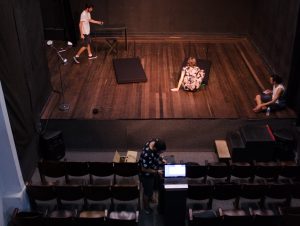photo by Nachelle Nocom
Scapi sat down with three University of Illinois at Chicago (UIC) School of Theatre and Music alumni: Karla Corona, Jabari Khaliq and Anonymous. The three performing artists are a few of many Black and Brown students and alumni advocating for systemic change within the theatre department in what they see as a culture of implicit racial bias that dehumanizes and minimizes the equity necessary to educate students of marginalized backgrounds.
UIC is Chicago’s only public university.
In contrast, the City Colleges of Chicago on the south and west side of the city are known for their general missions towards inclusivity in admission and retention of Black and Brown students, similar to the makeup of the neighborhoods they are in.
Many wonder why private institutions like DePaul, Loyola or U Chicago don’t have similar unrest. Anyone who has owned a U-Pass or spent St. Patty’s day on a college campus up north knows that the ‘N’ word and other slurs are widely used among many white and non-Black students under the guise of privacy and ignorance as well as non-Black faculty’s usage of such words under the guise of artistic and academic interpretation.
One acclaimed UIC professor has received backlash in the past after defending his use of the ‘N’ word in class and in publication as well as his questionable regard of race and ethnicity in western theatre. Read his opinions and criticism on Western and American theatre here.
The problem goes beyond slurs and epithets though. It presents intersectional implications as to where Chicago arts academia is in its conversations about race, racisms and the dynamic shifts towards challenging the systems and ideologies that currently hold power over the lives we live and the art we make.
If art were to merely imitate life and vice versa then devoting 4 years of time and thousands of dollars in resources would seem somewhat trivial. Good art illuminates the way we see the world; great art revolutionizes and changes the way we live.
There is one local university that seems to have had the most radicalizing effect on our cities continuing history with protest, direct action, demonstration and civil disobedience.
Northwestern’s rallying cry to defund the Evanston Police Department last year–Evanston Fight for Black Lives launches sit-in series to defund EPD–got as far as Evanston City Council but lost traction early July, 2020.
Other wards and townships around Chicagoland have led similar initiatives for their respective police departments but their ultimate ends have been similar to Evanston’s.
While it remains within the lining of American counter-culture, law enforcement funding allocation, police/prison reform and abolition are important conversations. The origins of these theories stem from the end of the Civil Rights Movement when the Black Panther Party and other radical pro-Black organizations formed in the late 60s.
See our latest take on police reform here.
In the wake of yet another deadly use of force, Chicago mourns the loss of Adam Toledo, the family of George Floyd and all other victims of police brutality and hate crimes.
To unpack the issue at UIC, we spoke first with actor and playwright, Karla Corona.
Karla was the first in her family to earn a college degree and secretly worked through rehearsals and nights at a 24 hour restaurant all throughout her tenure at UIC. BFA (Bachelors in Fine Arts) Acting majors are often discouraged from pursuing performative and sustaining work outside of the university if faculty feel like working will negatively impact their coursework performance or inconvenience the mainstage casting processes.
“I was a great student…I put so much work into all of my classes, I got A’s… So it wasn’t about the work…I wasn’t being cast.” Corona said.
UIC produces four mainstage shows a year, only one of which is focused on ethnocentric diversity–more often a show written for Black actors than not. In the past an August Wilson play was double cast with Black overstudies and Latino understudies.
“They were trying to throw Latinos in the Black show…there was a time where I had a callback for a Black role and I was uncomfortable.” She says recalling a script that included the ‘N’ word.
Karla recalls multiple times when she was called back for prominent roles written for Black women and was never cast. She regards the attempt at inclusion as dangerous and irresponsible, citing the need for plays written by and for Latino theatre artists.
“In [my] last two years there was a movement of like we want Latino work, we want something where we could feel represented because, you know, Latinos weren’t being cast. We finally got the first Latina show when I was a junior and I was cast in a very minor role and it was like this is my chance! Finally a role that looks like me, sounds like me you know? and then [they] put me as the role that barely speaks.. “
Corona’s range of roles in her time at UIC were limited and stereotypical to say the least; she played a maid, a role without dialogue and a character known solely as “Mexican Woman” in Tennesee Williams’ ‘A Streetcar Named Desire’.
After serving as the student representative for the School of Theatre her last year at UIC, Karla saw first hand how willing administrators would be towards effecting equitable change.
“I was putting students together, group chats, evidence, I had multiple meetings with [redacted] and [redacted], and they’re like ‘I just don’t understand. What’re we doing wrong?” she says, referring to meetings with two administrators.
Recalling one specific microaggression with another former instructor Corona speaks of a time when she was criticized for her Mexican dialect.
“She pulls me back into the room and she’s like ‘You know I didn’t mean to pull you aside from the students. Do you think I’m racist?’ it made me feel a little weird. If you have to ask me if that was racist the answer is probably yes.” she says.
Detailing their experience, the next person to speak with Scapi wishes to remain anonymous.
As noted in Karla’s interview, Black actors–while receiving the worst of the consequences of racism–in modern history have access to much more classic and contemporary stories written in English for the stage.
Whereas Karla felt her skills went underutilized, our anonymous speaker’s experience greatly contrasted.
“I feel, like, really ungrateful for saying this, because I felt like I was being overworked but to the point it was negatively affecting my mental and physical health in a significant way.” they said.
Over representation of specific narratives can be as big a problem as lack of representation, especially when the amount of people at these schools in need of representation outnumber traditional narratives..
We are well past several historic waves of immigration and people continue to immigrate to the U. S. from all of the world; it would be foolish to view our country as having only Black and White stories to tell.
The problem of overrepresentation of White people in art and media implies a false standard. Overrepresentation of any one ethnic group often contributes to other groups’ stigmatized and stereotyped experiences as well as their own.
Outside of race and ethnicity, other societal privileges involving physical characteristics like gender, weight, class, and others are also highly stigmatized in performing art.
It’s important to mention that Black faculty are also in the minority in many non-HBCU (Historically Black Colleges/Universities) institutions. UIC is no different.
This lack of diversity (three Black out of 27 School of Theatre faculty the rest of whom are white) creates a monolithic representation of Black theatre aesthetic while prioritizing White narratives and largely ignoring other racial and ethnic groups.
“In my [redacted] class with [redacted], I kinda teeter a little bit between trying to figure out whether it was just like a really good challenging class for me. Whether I’m receiving extra pushing because I was the only Black person or [if] it was like borderline excessive and unproductive because majority of that class was me being stopped in the first like five seconds of my scene…where as like my other classmates. It felt like they were receiving much more productive instances and critique in class.” they said.
It’s important to note that in Fall 2014, in an effort to diversify the department and earn more funds the School of Theatre increased the cap on admissions for the BFA and BA performance tracks. In two years the department nearly doubled creating an even greater problem for students needing space for class rehearsal or student projects.
The School of Theatre utilizes a mainstage blackbox, a smaller blackbox theatre and a few classrooms for voice and scene study work. Other buildings on campus and dance studios nearby are utilized for movement and freshman courses.
Students that have apartments large enough to accommodate their scene work will often schedule at home rehearsals. The increased population was not met with an equal increase in faculty and staff. It’s been reported that students at all levels and in all fields of study have suffered due to COVID-19.
One can imagine the difficulty of a year of virtual theatre training. Lastly, Scapi spoke with actor and filmographer, Jabari Khaliq.
“It is ridiculous that UIC did not adapt to Zoom school. They still said ‘no, do your scene, we’re still gonna do the same scene just talk through your scene partner through a camera. And then we sit here like why did the entire ensemble not get agents?” Khaliq said.
Khaliq released a 85 min long videographed evaluation detailing his experience and highlighting specific issues linked here.
In it he references an essay and a list of grievances written by upperclassmen and alumni that was delivered to the heads of the department.
“They would have to accept that their system is outdated,” Khaliq said. “They would have to accept that their system supports a lot of oppressive structures and they would also have to accept that everybody who’s in the room right now can’t be in the room…some people are going to have to leave.”
In August last year, UIC released two statements on their website titled ‘Theatre Anti-Racism Statement’ and ‘Land Acknowledgement Statement’ acknowledging “that Western theatre texts, history, performance, training, and pedagogy derive from a lineage of White Supremacy…” and a plan to move forward.
These statements begin to address some of these student’s concerns but provide no promise of diversifying faculty or creating more physical space for theatre students’ use. Time will tell if these statements are able to make an impact in the educational experiences of Black and Brown students at UIC in the semesters to come.












Be First to Comment